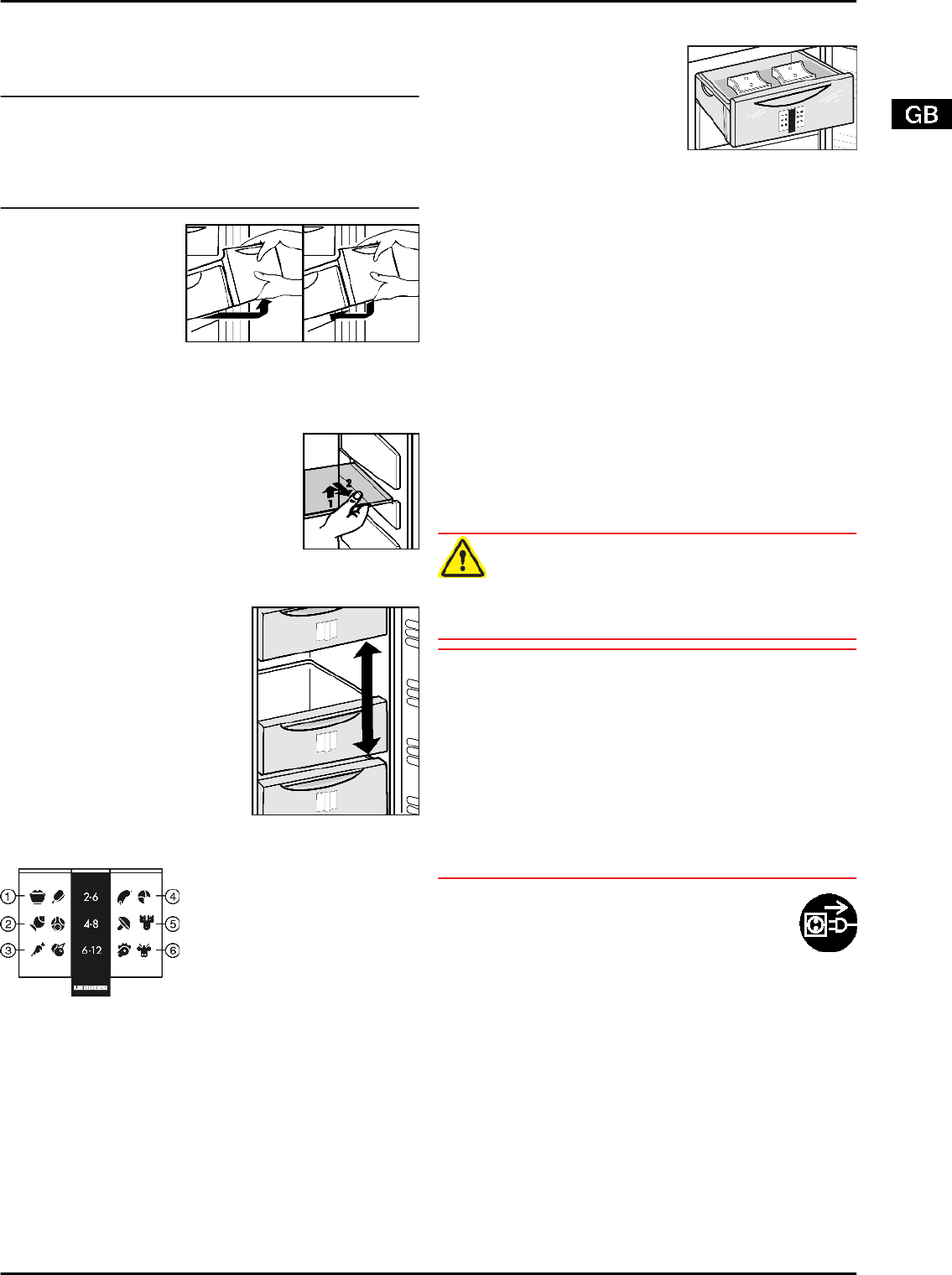
w
The appliance continues to operate in the energy-saving,
normal mode.
5.4.4 Drawers
Note
The energy consumption increases and the cooling perform-
ance decreases if there is insufficient ventilation.
For appliances with NoFrost:
u
Leave the bottom drawer in the appliance!
u
Always keep the air slits of the fan free at the rear wall!
u
To store frozen food directly on the shelves: pull the drawer
forwards and lift it out.
5.4.5 Shelves
u
To remove the shelf: lift up at the front
and pull out.
u
To put the shelf back: simply push in as
far as it will go.
5.4.6 VarioSpace
Apart from being able to remove the
drawers, you can also remove the
shelves, creating space for large
items of frozen food. Poultry, meat,
large pieces of game and high
bakery products can be frozen in
one piece and prepared.
u
The maximum load of frozen food
for the drawers is 25 kg each and
for the shelves 35 kg each.
5.4.7 Information system*
Fig. 11
(1) Ready-made meals, ice
cream
(4) Sausages, bread
(2) Pork, fish (5) Game, mushrooms
(3) Fruit, vegetables (6) Poultry, beef/veal
The figures indicate the storage time in months for several
types of frozen food in each case. Storage times given are
guide times.
5.4.8 Cold storage accumulators*
The cold storage accumulators prevent the temperature from
rising too fast in the event of power failure.
Using cold storage accumulators*
u
Place the cold storage accumula-
tors in the top freezer compart-
ment to save space.
u
Place the frozen cold storage
accumulators on the frozen food
in the upper front area of the
freezer compartment.
6 Maintenance
6.1 Defrosting with NoFrost
The NoFrost system automatically defrosts the appliance.
Refrigerator compartment:
The defrost water evaporates due to the compressor heat.
Drops of water on the rear wall are perfectly normal.
u
Regularly clean the drain opening to allow the water to flow
away (see 6.2) .
Freezer compartment:
The moisture condenses on the evaporator, is periodically
defrosted and evaporates.
u
The appliance does not have to be manually defrosted.
6.2 Cleaning the appliance
Before cleaning:
CAUTION
Risk of injury and damage as a result of hot steam!
Hot steam may damage the surfaces and cause burns.
u
Do not use any steam cleaners!
NOTICE
Incorrect cleaning damages the appliance!
u
Do not use cleaning agents in concentrated form.
u
Do not use any scouring or abrasive sponges or steel wool.
u
Do not use any cleaning agents containing sand, chloride,
chemicals or acid.
u
Do not use chemical solvents.
u
Do not damage or remove the type plate on the inside of the
appliance. It is important for the customer service.
u
Do not pull off, bend or damage cables or other compo-
nents.
u
Do not allow any cleaning water to enter the drain channel,
ventilation grille or electrical parts.
u
Empty the appliance.
u
Pull out the plug.
- Use soft cleaning cloths and a multi-purpose
cleaning agent with neutral pH value.
- Only use food compatible cleaning and care
agents on the inside of the appliance.
u
Regularly clean ventilation grilles.
w
Dust deposits increase energy consumption.
Outside surfaces and interior:
u
Clean the plastic surfaces, outside and inside, by hand
using lukewarm water and a little washing-up liquid.
Maintenance
9














